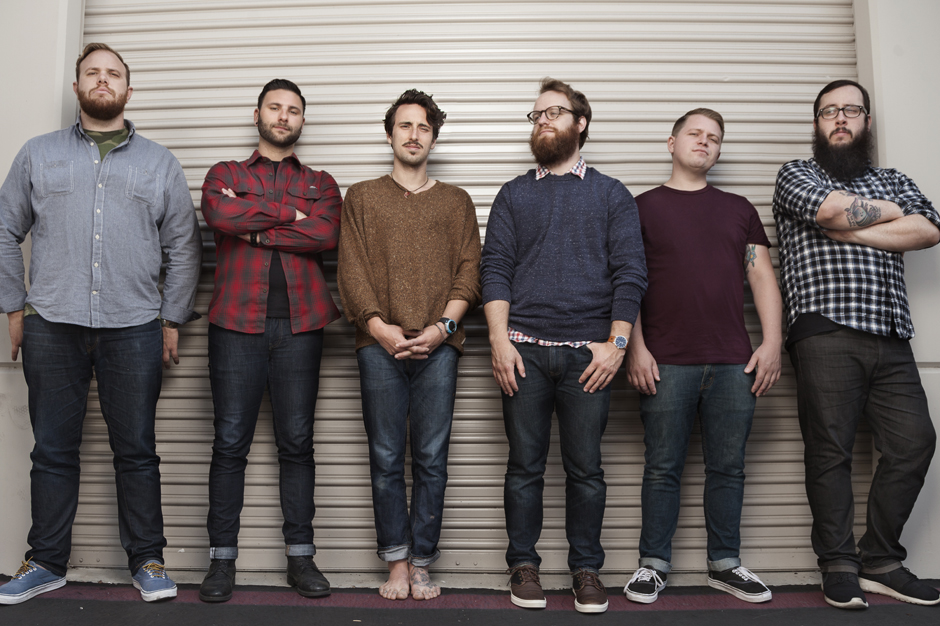Philadelphia emo revivalists The Wonder Years have never shied away from performing lyrical open-heart surgery. Their forthcoming studio album, No Closer to Heaven, is every bit as prepped for the scalpel as the four that came before it (2007’s Get Stoked On It!, 2010’s The Upsides, 2011’s Suburbia I’ve Given You All and Now I’m Nothing, 2013’s The Greatest Generation).
This time, however, lead singer and band lyricist Dan “Soupy” Campbell will sidestep the subjects he knows best (personal angst, suburban ennui, and general pennilessness) and focus on something more vast.
“I was sitting with all of these bigger ideas,” says Campbell over the phone. “And as I looked into them more, I realized how little I actually knew.”
One of those ideas catalyzed a grief-stricken song called “Thanks For the Ride” (available to stream below), which is written for a deceased friend of Campbell’s and imagines what her life would be like had she lived. “I wanted to write a verse that imagined a realistic ‘if you had come out of the coma [scenario],'” he says. “It was the idea of us losing touch after college, and here you got married to some boy in California and have a baby on the way. I really like that idea of, ‘We probably still wouldn’t talk, but you would be happy and that would be enough.”
Listen to “Thanks For the Ride” below, grab No Closer to Heaven on September 4 via Hopeless Records, and read SPIN‘s Q&A with the Wonder Years lead singer, who delves further into the band’s latest, writing songs about Patsy Cline and Ernest Hemingway, and working through an intense bout of writer’s block.
What is the title No Closer to Heaven about for you?
I was at this turning point with the [new] record where I was like, “I don’t want to write about the suburban American experience anymore, because I’ve written about it a hundred times.” I was thinking about other things in life that I wanted to touch on. It started to feel like I was in a footrace with an expanding universe, and I was never going to get to the finish line.
At that moment, you’re left with two decisions: You can say, if I’m never going to meet this utopian standard, then I might as well quit now and just set up camp here in the dark. Or you can say, despite the fact that I will never reach this goal, I’m not satisfied with where I am, and I’m going to keep moving forward.
There are a couple of songs on the record written for deceased writers or musicians (“A Song for Patsy Cline” and “A Song For Ernest Hemingway”). Why did you choose these two figures?
That was in regards to writer’s block and feeling as though you are failing at the one thing that you’re supposed to be good at. I was having a lot of trouble writing this record. So Patsy Cline was having – from my understanding –a lot of issues in her life. If you listen to “Love,” you can actually hear her crying at the end of the tape. She’s breaking. She was telling people that she knew she was going to die soon, before her plane went down, and she was obviously struggling with the spotlight and struggling with art in general.
Ernest Hemingway was similar. A bunch of different things weren’t going right for him [toward the end of his life]. So when I was writing those two songs, I felt a camaraderie with these fallen idols. Their stories got interwoven into the narrative of the song – into the narrative of expectation and writer’s block and how that was affecting me as a person.
When did you start feeling the symptoms of writer’s block? Because The Greatest Generation came out in 2013 — not too long ago.
I was trying to start fresh with this [album]. I would find myself falling back into similar patterns and getting frustrated. We have this standard that we hold ourselves to where if we don’t feel like we made the best record that we’ve ever made, then we’re not going to make the record. If we’re writing it and thinking, “This is good but it’s not great,” then it’s not even worth us recording it.
Why does “Cardinals” begin with imagery of a bird crashing into a window?
That actually happened. A bird came crashing into these big sliding glass doors that we had out back at my friend’s house. I looked at, and I wanted to know why. So I googled, and [I found out that] the bird doesn’t see a window — the bird sees the window’s reflection.
So I started thinking about this idea that when you grow up, specifically when you grow up privileged in America, you’re told everything is going to go your way, and you’re going to do all these great things. But the road map isn’t so much laid out for you as much as you’re just pumped up full of the idea. So at a certain point you have the same fate as that bird. You crash into what is a very literal glass ceiling, and that can be destructive for a lot of people.
There’s a song title, “I Don’t Like Who I Was Then.” Is there a specific time in your life that you’re referring to?
It’s about the idea that we talked about earlier: You’re going to f–k up a lot on the path of trying to be who you want to be. And it’s just looking back at all of the past me’s: me at 16, me at 19, me at 22 and thinking, “Jeez, man, that was self-centered, or that was selfish, or that was callous, or that was just mean, or I can’t believe that I would have said something like that.”





